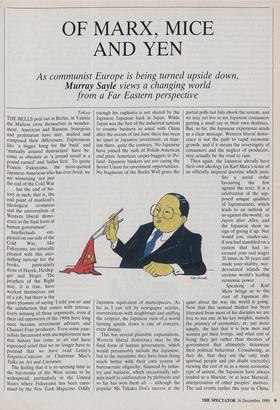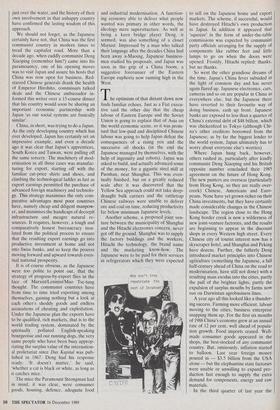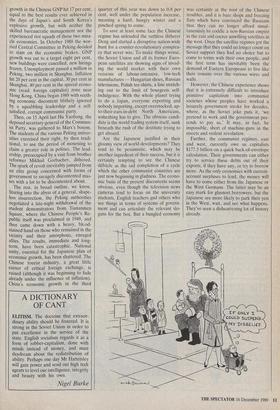OF MARX, MICE AND YEN
As communist Europe is being turned upside down,
Murray Sayle views a changing world
from a Far Eastern perspective
Tokyo THE BELLS peal out in Berlin, in Valetta the Maltese cross themselves in wonder- ment. American and Russian, bourgeois and proletarian have met, mulled and composed their differences. Expressions like 'a bigger bang for the buck' and mutually assured destruction' have be- come as obsolete as 'a pound saved is a pound earned' and 'ladies first'. To quote Francis Fukuyama, the most-quoted Japanese-American who has ever lived, we are witnessing 'not just the end of the Cold War . but the end of his- tory as such; that is, the end point of mankind's ideological evolution and the universalism of Western liberal demo- cracy as the final form of human government'.
Intellectuals em- ployed on our side of the Cold War, like Fukuyama, are naturally pleased with this asto- nishing turn-up for the
books, particularly those of Hayek, Heideg- ger and Hegel. The prophets of the Right may, it is true, have worked themselves out of a job, but there is the quiet pleasure of saying 'I told you so' and the satisfaction that comes with retroac- tively winning all those arguments, even if their old opponents of the 1960s have long since become investment advisers and Channel Four producers. Even some jour- nalists threatened with unemployment now that history has come to an end have expressed relief that we no longer have to pretend that we have read Lenin's Empirio-Criticism or Chairman Mao's Talks on Art and Literature.
The feeling that it is re-opening time in
the bar-rooms of the West seems to be widespread. particularly in the United States where Fukuyama has been cano- nised by the New York Magazine. Oddly
enough his euphoria is not shared by the Japanese Japanese back in Japan. While Japan was the first of the industrial nations to resume business as usual with China after the events of last June there has been no spurt in Japanese investment, or tour- ism there, quite the contrary. No Japanese have joined the rush of Polish-American and plain American carpet-baggers to Po- land. Japanese bankers are not casing the Soviet Union for investment opportunities. No fragments of the Berlin Wall grace the
Japanese equivalent of mantelpieces. As far as I can tell by newspaper articles, conversations with neighbours and sniffing the zeitgeist, the Japanese view of a world turning upside down is one of concern, even dismay.
This has several plausible explanations. Western liberal democracy may be the final form of human government, which would presumably include the Japanese, but in the meantime they have been doing much better with their own system of bureaucratic oligarchy, financed by indus- try and business, which occasionally sub- mits itself to confirmation by plebiscite and so far has won them all — although the popular Ms Takako Doi's success at the partial polls last July shook the system, and we may yet live to see Japanese consumers getting a small say in their own destinies. But, so far, the Japanese experience sends us a clear message: Western liberal demo- cracy is not the path to rapid economic growth, and if it means the sovereignty of consumers and the neglect of producers, may actually be the road to ruin.
Then again, the Japanese already have their own ideology (in Karl Marx's sense of an officially inspired doctrine which justi- fies a social order favouring the few against the rest). It is a celebration of the sup- posed unique qualities of Japaneseness, which leads to an outlook of us-against-the-world, or Japon uber Alles, and the Japanese show no sign of giving it up. Nor would you, reader-sari, if you had stumbled on a system that had in- creased your real wages 20 times in 30 years and made your shabby, war- devastated islands the envious world's leading economic power.
Speaking of Karl Marx brings us to the root of Japanese dis- quiet about the way the world is going. Now that this seminal thinker has been liberated from most of his disciples we are free to use one of his key insights, namely the primacy of economics, or, put more simply, the fact that it is how men and women get their livings, and what sort of living they get rather than theories of government that ultimately determine their political behaviour. Considering, as they do, that they are the only truly spiritual people and (no doubt correctly) viewing the rest of us as a more economic type of animal, the Japanese have always tended to a Marxist, or at least Marxoid, interpretation of other peoples' motives. The sad events earlier this year in China, just over the water, and the history of their own involvement in that unhappy country have confirmed the lasting wisdom of this approach.
We should not forget, as the Japanese certainly have not, that China was the first communist country in modern times to tread the capitalist road. More than a decade ago, when cuddly communist Deng Xiadping (remember him?) came into his paramountcy, one of his opening moves was to visit Japan and assure his hosts that China was now open for business. Red- starred Chinese generals drank the health of Emperor Hirohito, commissars talked deals and the Chinese ambassador in- formed this writer over a 15-course dinner that his country would soon be sharing an important economic partnership with Japan 'as our social systems are basically similar'.
China, in short, was trying to do a Japan. As the only developing country which has ever developed, Japan has certainly set an impressive example, and even a decade ago it was clear that Japan's apprentices, South Korea and Taiwan, were pulling off the same sorcery. The machinery of mod- ernisation in all three cases was manufac- turing for export, starting off with the familiar cut-price shirts and shoes, and climbing the technological ladder as fast as export earnings permitted the purchase of advanced foreign machinery and technolo- gy. This strategy maximises the only com- parative advantages most poor countries have, namely cheap and diligent manpow- er, and minimises the handicaps of decrepit infrastructure and meagre natural re- sources. It requires, however, a tough and comparatively honest bureaucracy insu- lated from the political process to ensure that the resulting export earnings go into productive investment at home and not into Swiss banks, and so keep the process moving forward and upward towards even- tual national prosperity.
It is of course obvious, as the Japanese were too polite to point out, that the strategy of progress-by-export flies in the face of Marxist/Leninist/Mao Tse-tung thought. The communist countries have from time to time tried exporting among themselves, gaining nothing but a look at each other's shoddy goods and endless accusations of cheating and exploitation. Under the Japanese plan the exports have to be qualified, rich markets, that is to the world trading system, dominated by the spiritually polluted English-speaking bourgeoisie and our running dogs, the very same people who have been busy approp- riating the surplus value of the internation- al proletariat since Das Kapital was pub- lished in 1867. Deng had his response ready: It doesn't matter,' he said, `whether a cat is black or white, as long as it catches mice.'
The mice the Paramount Strongman had in mind, it was clear, were consumer goods, housing, defence, adequate food and industrial modernisation. A function- ing economy able to deliver what people wanted was primary in other words, the ideology mere superstructure. As well as being a keen bridge player Deng, it seemed, was also something of a closet Marxist. Impressed by a man who talked their language after the decades China had been away a-Maoing, Japanese business- men studied his proposals, and Japan was soon in the grip of a China boom, a suggestive forerunner of the Eastern Europe euphoria now running high in the West.
The optimism of that distant dawn now finds familiar echoes. Just as a Fiat execu- tive said the other day that the cheap labour of Eastern Europe and the Soviet Union is going to replace that of Asia on the world economic scene, so it was prom- ised that low-paid and disciplined Chinese labour was going to help Japan defeat the consequences of a rising yen and the successive oil shocks (in the end the Japanese managed by themselves, with the help of ingenuity and robots). Japan was asked to build, and actually advanced some of the money, for a gigantic steel Mill at Paoshan, near Shanghai. This was even- tually finished, but on a greatly reduced scale after it was discovered that the Yellow Sea approach could not take deep- draught bulk carriers and the rattletrap Chinese railways were unable to deliver ore and coal on time, reducing productivity far below minimum Japanese levels.
Another scheme, a proposed joint ven- ture between the municipality of Shanghai and the Hitachi electronics concern, never got off the ground. Shanghai was to supply the factory buildings and the workers, Hitachi the technology, the brand name and the marketing know-how. The Japanese were to be paid for their services in refrigerators which they were expected to sell on the Japanese home and export markets. The scheme, if successful, would have destroyed Hitachi's own production in Japan. In addition it appeared that 'squeeze' in the form of under-the-table commissions was expected by communist party officials arranging for the supply of components like rubber feet and little lamps to go on when the doors were opened. Frostily, Hitachi replied: thanks, but no thanks.
So went the other grandiose dreams of the time. Japan's China fever subsided in the light of common day and has never again flared up. Japanese electronics, cars, cameras and so on are popular in China as everywhere else, but the Japanese there have reverted to their favourite way of doing business, cash up front. Japanese banks are exposed to less than a quarter of China's external debt of $48 billion, which was chickenfeed to Tokyo (although Chi- na's other creditors borrowed from the Japanese; as by far the biggest lender to the world system, Japan ultimately has to worry about everyone else's worries).
Where Japan hung back, however, others rushed in, particularly after kindly communist Deng Xiaoping and his British opposite number concluded their 1985 agreement on the future of Hong Kong. The new punters are overseas (particularly from Hong Kong, so they are really over- creek) Chinese, Americans and Euro- peans. None have yet grown richer on their China investments, but they have certainly made considerable changes in the Chinese landscape. The region close to the Hong Kong border creek is now a wilderness of new joint-venture factories, and the results are beginning to appear in the discount shops in every Western high street. Every Chinese city of tourist interest now has a skyscraper hotel, and Shanghai and Peking have dozens. Further, the fatherly Deng introduced market principles into Chinese agriculture (something the Japanese, a full half-century ahead of China on the road to modernisation, have still not done) with a resulting mass exodus into the cities, partly the pull of the brighter lights, partly the expulsion of surplus mouths by farms now run on Darwinian agrobusiness lines.
A year ago all this looked like a thunder- ing success. Farming more efficient, labour moving to the cities, business enterprise snapping them up. For the first six months of 1988 China's economy grew at an annual rate of 12 per cent, well ahead of popula- tion growth. Food imports ceased, Well- made consumer goods appeared in the shops, the best-stocked of any communist country. But, ominously, inflation started to balloon. Last year foreign money poured in — $3.5 billion from the USA alone — but the elephantine state factories were unable or unwilling to expand pro- duction fast enough to supply the extra demand for components, energy and raw materials.
In the third quarter of last year the growth in the Chinese GNP hit 17 per cent, equal to the best results ever achieved in the days of Japan's and South Korea's explosive growth, but with neither the skilled bureaucratic management nor the experienced riot squads of those two mira- cle economies. In October 1988 the wor- ried Central Committee in Peking decided to slam on the economic brakes. GNP growth was cut to a target eight per cent, new buildings were cancelled, new Wrings frozen. Unemployment passed a million in Peking, two million in Shanghai. Inflation hit 20 per cent in the capital, 30 per cent in Shanghai, 40 per cent in the special econo- mic (read: foreign capitalist) zone near Hong Kong. China began 1989 with seeth- ing economic discontent blithely ignored by a squabbling leadership and a self- satisfied, corrupt communist party. Then, on 15 April last Hu Yaobang, the deposed secretary-general of the Commun- ist Party, was gathered to Marx's bosom. The students of the various Peking univer- sities exercised their right, by then tradi- tional, to use the period of mourning to claim a greater role in politics. The lead- ership, preoccupied by a visit from brother reformer Mikhail Gorbachev, dithered. The spark of revolt inevitably jumped from an elite group concerned with forms of government to savagely discontented mas- ses with a lot to be discontented about.
The rest, in broad outline, we know. Staring into the abyss of a general, shape- less insurrection, the Peking authorities negotiated a late-night withdrawal of the student demonstrators from Tiananmen Square, where the Chinese People's Re- public itself was proclaimed in 1949, and then came down with a heavy, blood- stained hand on those who remained in the vicinity and their amorphous, enraged allies. The results, immediate and long- term, have been catastrophic. National unity, essential for the Japanese plan of economic growth, has been shattered. The Chinese tourist industry, a great little earner of critical foreign exchange, is ruined (although it was beginning to fade already under the influence of inflation). China's economic growth in the third quarter of this year was down to 0.8 per cent, well under the population increase, meaning a hard, hungry winter and a pinched spring to come.
To save at least some face the Chinese regime has unloaded the ruthless ditherer Deng and started a disruptive nation-wide hunt for a counter-revolutionary conspira- cy that never was. To make things worse, the Soviet Union and all its former Euro- pean satellites are showing signs of invad- ing the world market with their own versions of labour-intensive, low-tech manufactures — Hungarian shoes, Russian televisions, Polish tee-shirts, a line stretch- ing out to the limit of bourgeois self- indulgence. With the whole planet trying to do a Japan, everyone exporting and nobody importing, except overstocked, up- to-their-ears-in-debt North Americans, something has to give. The obvious candi- date is the world trading system itself, sunk beneath the rush of the destitute trying to get aboard.
Are the Japanese justified in their gloomy view of world developments? They tend to be pessimistic, which may be another ingredient of their success, but it is certainly tempting to see the Chinese debacle as the sad completion of a cycle which the other communist countries are just now beginning in gladness. The econo- mic basis of the present discontents seems obvious, even though the television news cameras tend to focus on the university students, English teachers and others who see things in terms of systems of govern- ment and can articulate the relevant slo- gans for the box. But a bungled economy was certainly at the root of the Chinese troubles, and it is bare shops and freezing flats which have convinced the Russians that they can no longer afford simul- taneously to coddle a non-Russian empire in the cast and coerce unwilling satellites in the west. Once the satellite regimes got the message that they could no longer count on Soviet support they had no choice but to come to terms with their own people, and the first term has inevitably been the demand of Eastern Europeans to live like their cousins over the various wires and walls.
However, the Chinese experience shows that it is extremely difficult to introduce primitive capitalism into communist societies whose peoples have worked a leisurely government stroke for decades, where, as the Soviet joke puts it, 'we pretend to work and the government pre- tends to pay us.' It may, in fact, be impossible, short of machine-guns in the streets and violent revolution.
Further, the communist regimes, east and west, currently owe us capitalists $177.5 billion on a quick back-of-envelope calculation. Their governments can either try to service these debts out of their exports, if they have any, or try to borrow more. As the only economies with current- account surpluses to lend, the money will have to come either from the Japanese or the West Germans. The latter may be an easy mark for glasnost borrowers, but the Japanese are more likely to park their yen in the West, wait, and see what happens. They've seen a disheartening lot of history already.




















































 Previous page
Previous page